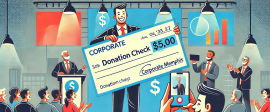Home » Resources » Vibes, Memes, and Votes: How Influencers Are Shaping the Political Landscape
Vibes, Memes, and Votes: How Influencers Are Shaping the Political Landscape
- September 10, 2024
- Written by Russ Gottwald
Article after article after article was written about the presence of influencers at the Democratic Convention last month. Why all the hoopla? After all, there were only 200 credentialed at the event, as opposed to over 15,000 journalists.
And influencers aren’t exactly a new phenomenon; the Instagram parody account “Influencers in the Wild has been around since 2019, after all. Nor did they just get involved with politics. Prominent Republicans in particular, including figures like Representatives Lauren Boebert, Marjorie Taylor Greene, and Matthew Gaetz, were social media figures before running for office. For that matter, Donald Trump himself – a “lifestyle influencer” long before that term had been invented – built his political following on the back of his Twitter following, bypassing traditional media filters and influencing public discourse in real-time.

OK, then What Gives?
So influencers have been around for a while, and they’ve been involved in politics for at least the past decade, particularly on the Republican side. With Democrats playing catchup in a form of voter outreach for the first time since the direct mail era, some sort of reaction was inevitable if they were to have a chance of winning this election. But it was the particular mixture of three elements that 2024’s DNC social media joyruption happen: COVID, Gen Z…and a final catalyst.
Pandemic-era social isolation affected Gen Z more deeply than any other age group. With face-to-face interaction drastically curtailed during formative years, this already digital-native generation was forced to make up for the (in some cases, very relative) lack of social interaction in virtual spaces. TikTok’s popularity exploded, to the point where it’s how a plurality of Gen Z gets its news. Where the Republicans’ older low-propensity voter groups actively disdain the legacy media, Gen Z has, simply, moved on. Interestingly, Gen Z is more likely than their older generational counterparts to fall for fake headlines; and not because they don’t know how to fact check, but because they’re twice as likely to trust information shared online by “people like them than traditional, mainstream news.
In years past, big celebrity headliners were the easy way to get eyeballs at conventions. But those shiny big names do little for Gen Z—a majority of this generation actively trust influencers more than celebrities, meaning Dems would have to leverage social media…but influencers were wary of backlash. Taking sides was risky. Influencers needed motivation.
And then Kamala Harris replaced Joe Biden at the top of the ticket.

Somewhere between that moment, the Olympics, and the DNC, a whole lot of apparently pent-up positivity erupted. “Kamala Is Brat.” “Tim Walz is America’s Dad.” Meme on meme on meme. What’s noteworthy is that the Democrats have thus far been very savvy about how they reacted – rolling with the phenomenon rather than trying to control it or stop it. It’s vibes…and social media loves vibes.
Vibes Are Vibes, and Brands Are Brands – Even in Politics
Are there lessons to be learned here? Of course! Take away the implications for things like the rule of law and national security, and unique considerations like the election calendar, and you’re left with two campaigns facing a classic business dilemma: how much effort to invest in 1) stealing share from one’s opponent (i.e. pursuing swing voters) vs. 2) increasing devotion among existing enthusiasts (i.e. motivating the base) vs. 3) gaining share by attracting people from outside the category (i.e. encouraging turnout among friendly low-propensity voter groups).
The Republicans have, as with their campaign as a whole, staked their influencer efforts on the second strategy to the near-exclusion of the first and ambivalence towards the third. Meanwhile, the Democrats are relying more heavily on a friendly third-party constellation of influencers to pursue the third strategy for them, making sure their own campaign doesn’t undermine the phenomenon while pursuing the first strategy themselves.

As we gear up for the first presidential debate between former President Trump and Vice President Harris, we’re likely to see fingers hit keyboards before the first remark is even made. Within 24 hours, debate highlights will flood TikTok, and influential voices from both political parties will share POVs across social media and podcasts. Regardless, it’s impossible to ignore the role influencers play in driving public discourse. And if you’re curious about how to make that work for your company or even how we see this playing out politically, we’d love to discuss it.
P.S. don’t forget to register to vote.











